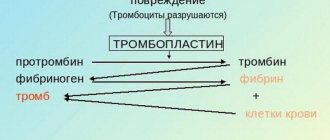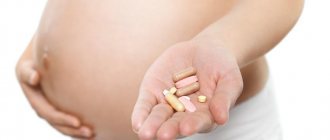Intrauterine development of a child at 19 weeks of pregnancy
By mid-term, the baby weighs approximately 300-350 g, and the length of his body from head to toe is approximately 25 cm. Organs and systems are not yet sufficiently developed, but this process is in full swing. Let's take a closer look at what the fetus looks like at 19 weeks of pregnancy:
- The fat layer under the baby’s skin has not yet formed, so the skin is quite thin, wrinkled and has a reddish tint. The epidermis is covered with a protective cheese-like lubricant, and the baby will be born with it. Subcutaneous tissue is just beginning to form; after birth, this fat will serve as the main source of energy for the small organism.
- At the 19th week of pregnancy, a child undergoes intensive development of the brain and the entire central nervous system. Nerve cells form connections, the brain builds up the cortex. At this time, the fetus's reflexes become more complex, it learns to move its limbs, blink, swallow, open its mouth and perform sucking movements.
- The baby in the womb recognizes external sounds. Loud and sharp screams can frighten him, and a slow, beautiful melody can calm him down. Many mothers, starting from this period, let their babies listen to music and talk to them.
- At the 19th week of pregnancy, the development and improvement of the digestive organs continues. The intestines begin to fill with meconium - original feces formed from microparticles that the child swallows along with amniotic fluid.
- The fetal kidneys also improve and begin to work, removing urine.
- At this stage of pregnancy, the lungs are finally formed.
The location of the fetus at the 19th week of pregnancy can be completely different. The tiny organism is still so small that it can turn over in the womb as it pleases. Children born during this period, as a rule, do not survive. At this time, as during the entire period of bearing a child, the expectant mother should carefully monitor her own health, nutrition and lifestyle.
At the 19th week of pregnancy, the fetus is already giving full signals of its presence. He had done this before, but due to its small size, the woman most likely did not feel any shocks or movements. By the middle of the term, the expectant mother begins to feel her baby, which gives her indescribable delight and pleasure.
Distinctive signs of the period in the fetus on ultrasound
At 19 weeks, the pregnant woman is screened. General clinical examinations of blood and urine are performed to exclude toxicosis or inflammatory changes. An important examination is the ultrasound method, which allows you to determine the following criteria:
- fruit size;
- preliminary weight of the child;
- anatomical parameters and their relationship;
- the presence of developmental anomalies;
- motor activity;
- heartbeat;
- quantity and characteristics of amniotic fluid;
- sexual characteristics.
Ultrasound during this period is a mandatory study. The specialist determines the size of the nasal bones and the collar area. Changes in these zones indirectly indicate pathological development of the fetus. Genetic counseling may be needed. In this situation, parents, together with the doctor, make a responsible decision about the further management of the pregnancy. Also an important criterion is the proportional development of the head, torso and limbs of the unborn child. The volumes of the chest, head and abdomen are determined.
Determining the quantity and quality of amniotic fluid is a mandatory study. Transparency and the presence of additional inclusions are visualized. An important indicator of pregnancy is the condition of the uterus, cervical part, its size and structure, the location of the placenta, and the structure of the umbilical cord vessels.
Some women doubt the safety of this research method. This issue remains controversial for some scientists who talk about the negative impact of rays on the fetus. However, at present there is no alternative to ultrasound. Doctors recommend adhering to the optimal timing of the examination, taking into account screening. Increasing the frequency of ultrasound must be carried out according to strict indications.
Feelings of a woman at 19 weeks of pregnancy
With the arrival of the “golden” middle of pregnancy, tangible changes occur in a woman’s body and appearance. The belly has already grown to such a size that it is quite difficult not to notice it. At this time, a pregnant woman may feel discomfort in the navel area - this is due to the enlarged uterus, which presses on it from the inside. Many women note that the navel has begun to protrude outward - this is a completely painless and normal phenomenon; after childbirth, the navel will return to its original appearance.
From the very beginning of pregnancy, doctors prohibit expectant mothers from lying on their stomachs. By week 19, turning over on your stomach at night becomes physically impossible. However, the stomach is not yet so large as to cause discomfort during sleep. Cramps in the legs and hands are considered a common occurrence during this period. Such cramps most often occur at night; to get rid of them, you should reconsider your diet and eat more foods rich in calcium. Products useful for pregnant women include cottage cheese, cheese, milk and any fermented milk products, almonds, sesame seeds, etc. At the 19th week of pregnancy, the expectant mother’s blood pressure is often low, which is a consequence of the intense production of progesterone, which weakens peripheral blood vessels.
Iron deficiency anemia or simply a reduced hemoglobin level is also a common phenomenon that makes itself felt in the second half of pregnancy. Anemia can be explained by an increase in blood volume in the body, and among the symptoms of the disease are dizziness, fatigue, weakness in the legs, and fatigue. To reduce the likelihood of symptoms, pregnant women are advised not to make sudden movements, not to get out of a chair or bed too quickly, and to rest more often. But anemia itself can be cured by regular consumption of certain foods and vitamin complexes that contain iron. There are also particularly severe cases of the disease, in which an ordinary diet simply cannot be done - in such a case, the doctor, based on the test results, will prescribe special medications.
By the 19th week of pregnancy, a woman’s body begins to actively produce melanin - it is responsible for the color of the baby’s hair, skin and eyes. The expectant mother can notice the production of melanin by a change in the color of her skin: the nipples become darker, a stripe appears on the stomach leading from the navel to the perineum, the skin in the armpits and genitals may also darken. Freckles become brighter, and some women develop pigmentation on their faces. A few months after giving birth, all these manifestations will gradually disappear.
At this stage, a pregnant woman may experience periodic bouts of fever, increased sweating, increased heart rate and heavy vaginal discharge. An increase in the size of the fetus at the 19th week of pregnancy, an increase in amniotic fluid, growth of the uterus and other factors provoke the appearance of additional kilograms of weight. Normal weight gain at this stage is 250-300 g per week; on average, from the beginning of pregnancy, the weight of the expectant mother should increase by 4-6 kg. This indicator may fluctuate slightly in any direction due to the individual characteristics of each woman.
Changes in a woman’s body and sensations
- The skin on your abdomen may become very itchy. It's all because of the growing uterus. You can improve the situation a little by using a moisturizer.
- For most women, morning sickness has already passed.
- Vasomotor rhinitis (nasal congestion) may make it difficult for you to fall asleep. We strongly recommend that you do not use vasoconstrictor drops, because they are addictive and can harm even the baby in the womb. You can alleviate your condition with sea drops or sprays.
- Back pain becomes more and more noticeable. There is no way to get rid of it at all. Try to relax and rest as often as possible.
- Swelling of the legs may occur. Read the link to find out how to deal with them.
- If the sciatic nerve is pinched, rubbing, compresses, gymnastics and massage will help.
- If you are often bothered by leg cramps, you may want to take a course of Magnesium and Calcium. Ask your gynecologist for advice.
- Often, indigestion, asthma, heartburn, and stress lead to chest pain. You can get rid of this trouble, but before that you need to find out the reason that provokes it. If this is a growing fetus, then you should be patient a little, nothing can be done about it.
Necessary tests at 19 weeks of pregnancy
During the entire period of bearing a child, a pregnant woman undergoes many tests from time to time to monitor her health and detect abnormalities in a timely manner. At the 19th week of pregnancy, the doctor may refer the woman for a routine blood test, which will show the level of sugar and hemoglobin. At the same time, a general urine test is taken.
To make sure that the pregnancy is going well, the expectant mother may have her progesterone levels checked. If a woman has any problems, for example, uterine hypertonicity, then a progesterone test is mandatory. In order to identify chromosomal abnormalities in a child, a pregnant woman can undergo a screening blood test for hCG.
Ultrasound at 19 weeks of pregnancy
At the 19th week of pregnancy, a routine ultrasound examination is performed. During an ultrasound, the doctor examines the baby’s nasal bone, checks the thickness of the collar zone, examines the fetus for any pathologies, measures its heartbeat, and checks motor activity. The doctor evaluates the amount and condition of amniotic fluid and also checks the myometrium of the uterus. By the middle of pregnancy, many parents find out the gender of their baby, and can also look at his face, which has formed the features.
Abdominal condition at 19 weeks of pregnancy
The expectant mother's rounded belly is already clearly visible from under her clothes, although its size does not yet cause any noticeable discomfort. Many pregnant women may feel abdominal pain at this stage. The nature and causes of such pain vary, so in order to avoid problems, it is important to listen carefully to your body and tell your doctor about everything.
As pregnancy progresses, the ligaments holding the uterus are subject to constant stress and stretching, which provokes the appearance of mild pain on the sides of the abdomen. Such sensations are inconsistent, appearing during turns, bends, and sudden movements. The uterus has already reached a fairly large size and is constantly pressing on the navel, which can also cause discomfort.
Pathological pain includes pain associated with uterine hypertonicity. They manifest themselves in the form of constant pulling sensations in the lumbar region or lower abdomen. Hypertonicity is a fairly common phenomenon among pregnant women, which carries a risk to the normal course of the process and in some cases can provoke the threat of miscarriage. Fortunately, this problem is easily identified and treatable.
If at 19 weeks of pregnancy your stomach hurts severely or constantly, you should immediately complain to your doctor. Sharp, cutting or cramping pain should also be a cause for concern. The presence of atypical discharge of red, pink, brown, greenish color is a reason to go to the hospital as quickly as possible. If you notice bleeding from the genital tract, you should immediately call an ambulance. If there is a threat of spontaneous abortion, in many cases the pregnancy can be saved if you go to the hospital on time and follow all the doctors’ recommendations.
Movements
It is at the 5th month of gestation that the most unforgettable sensations appear in the stomach - these are the movements of the babies. As the children grow, the mother feels the movements more and more, she feels somersaults, pushes, turns.
Depending on the stage of development of the muscular system, the growth of the fetus and the amount of free space in the uterus, the type, frequency and strength of movements changes.
What are they like
Movement is a signal that makes it clear that the development of the fruit continues. The expectant mother often confuses the first movements with flatulence.
Some women note the similarity with the movement of gases through the intestines, while for others they resemble the swimming of a fish. At first these are weak and rare tremors, which become more noticeable over time.
The intensity of perception largely depends on the weight and sensitivity threshold of the pregnant woman.
Women with an asthenic physique begin to feel fetal movements earlier.
Usually the movements are more intense in the evenings, when the woman is resting.
If they are not there
Although children have a natural need to move, they still need rest. Periods of activity are followed by periods of rest when the twins sleep. Therefore, the expectant mother should not worry if she does not feel any movements for several hours.
But if the “lull” lasts a whole day, you need to urgently consult a doctor and determine its cause.
How often should babies move?
Regular movements of the baby are an important indicator of the normal course of pregnancy. Frequent movements should not bother a woman. They mean babies are awake.
The activity of the fruit depends on several factors:
- mother’s behavior (when she rests, the children have more room to move);
- time of day (the greatest activity is observed in the evening and at night);
- noise level (with loud sounds, babies begin to move intensely).
At this stage, there is no need to attach too much importance to the movements of the fetus; the woman cannot yet feel every push. It is enough to note from 10 to 15 movements per day.
Doctors recommend concentrating attention and carefully counting them from the 28th week of pregnancy.
You might be interested to know
In what cases is a pessary installed with twins? Read our article.
Crib for twins - which is better? Find out here.
Nutrition at 19 weeks of pregnancy
A balanced and nutritious diet is the key to the health of any person, especially a pregnant woman. The expectant mother's diet should contain foods rich in proteins, microelements, vitamins, and carbohydrates. Without fats, food also cannot be called complete, but their amount should be moderate.
The food a pregnant woman eats should be natural. You should avoid products containing dyes and large amounts of preservatives. Fried in oil, smoked, excessively fatty and spicy foods are also prohibited. You should not consume excessive amounts of salt, as it retains fluid in the body and contributes to the formation of edema. Carbonated drinks can cause gas formation in the intestines and lead to unpleasant pain in the abdominal area.
Sweets for pregnant women, in principle, are not harmful, unless they contain the already mentioned dyes and preservatives. However, you also need to eat sweets with caution, since such food contributes to excess weight gain, which is quite difficult to get rid of after childbirth.
It is best to steam or bake food - this way it retains the maximum amount of nutrients and nutrients. Foods containing iron and calcium, as well as other vitamins, are considered beneficial for pregnant women. The diet should be rich in fresh herbs, fruits and vegetables, dried fruits and cereals, and low-fat protein products.
19th week of pregnancy, photo:











